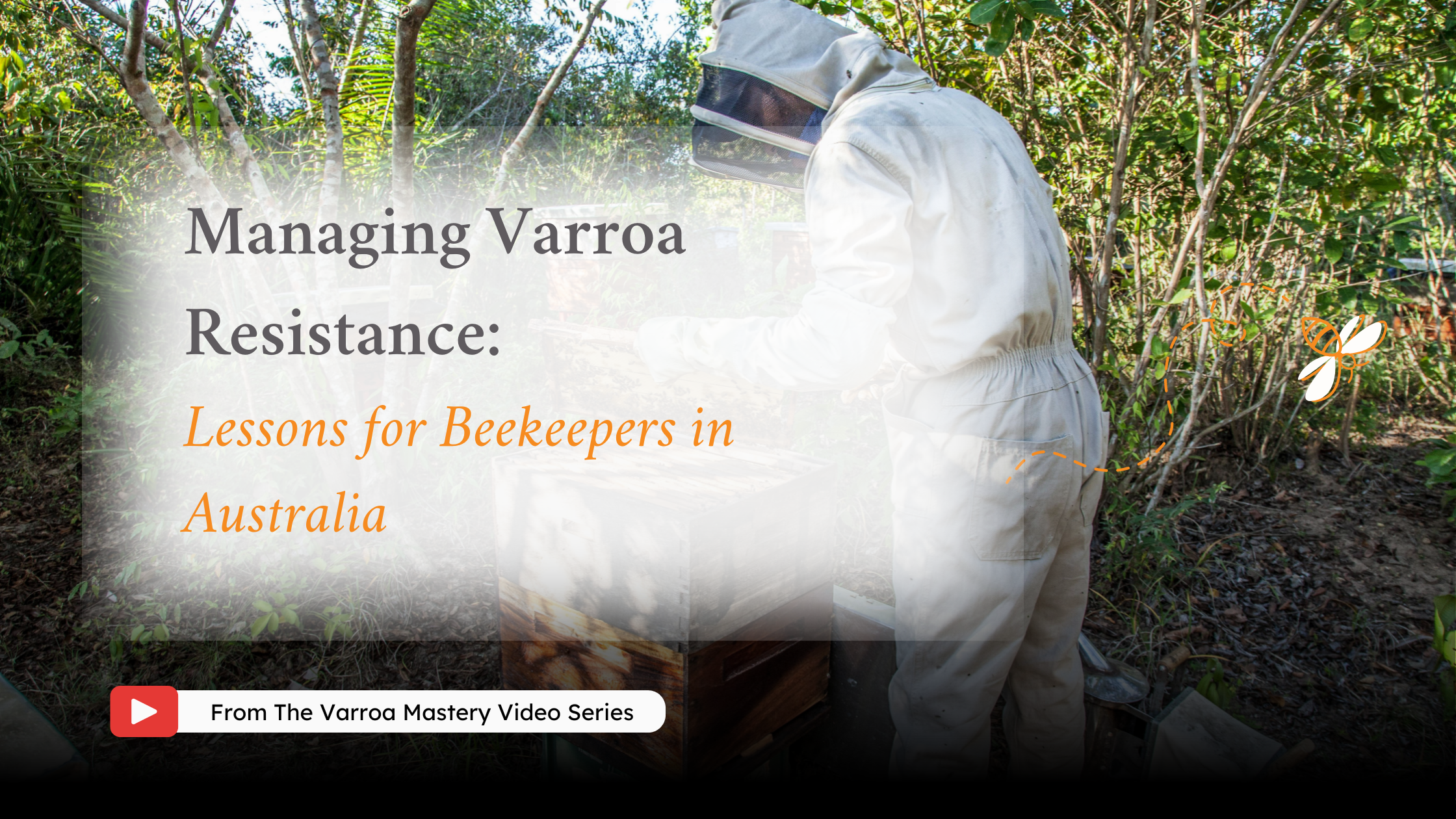Managing Varroa Mite Resistance: A Smart Approach for Beekeepers
- Varroa mites can develop resistance to chemical treatments, making resistance management crucial.
- Alternate different treatment types each season to slow down resistance development.
- Always check Varroa levels after treatment to make sure it worked.
- Learning from New Zealand's experience helps Australian beekeepers prepare for Varroa challenges.
Introduction: The Challenge of Varroa Mite Resistance
Beekeeping requires constant care in the face of challenges. One tough adversary in the apiary world is Varroa destructor, a tiny mite that preys on honeybee colonies. This article focuses on a pressing concern for beekeepers everywhere: Varroa mites developing resistance to the very chemicals we use to control them.
We will look at why resistance management matters, drawing insights from an experienced beekeeper's perspective in New Zealand. Understanding these lessons can help Australian beekeepers protect their hives.
Watch Video Here: Varroa Mite Resistance Management
Understanding Varroa Resistance Management: A Key to Healthy Hives
Resistance management refers to the ability of Varroa mites to develop resistance to the chemicals beekeepers use for control. Just like with pests in farming, beekeepers need to stay alert as Varroa mites change and adapt. This vigilance is crucial for keeping your colonies strong and healthy in the long run.
Key Ways to Manage Varroa Resistance:
Alternating Treatment Types:
- A main recommendation is to alternate different treatment types. Beekeepers should use different kinds of chemicals for spring and autumn treatments. This smart approach helps slow down how quickly mites become resistant, giving you a better way to control Varroa over time. You can find a complete range of Varroa mite treatments at Ecrotek.
Checking Varroa Levels:
- While changing treatments is good, it's also important to check Varroa levels after each treatment. Many beekeepers often miss this important step. Not checking after treatment can lead to treatments not working well and can cause big hive losses. Tools like Varroa mite monitoring tools can help.
Understanding Beekeeper Habits:
- A common challenge is the belief that once a treatment is used, the problem is solved. This can happen when beekeepers go on holiday right after treating their hives. This assumption can actually help resistance grow. It's important to change this thinking and always check carefully after treating.
The Impact of Resistance:
- The real impact of resistance is serious. Around 2010, beekeepers in New Zealand saw mites become resistant to some synthetic treatments. This resistance has caused thousands of hive losses each year. With more active resistance management, these losses could have been much lower.
Systematic Steps for Effective Varroa Resistance Management:
To keep your hives strong and reduce resistance, follow these simple steps:
Step 1: Know Your Products
Before you start, understand the different types of Varroa treatments available and which chemical family each belongs to. This knowledge will help you rotate them effectively.
Step 2: Plan Your Treatment Rotation
Decide which treatment you will use in spring and which in autumn. Make sure they are from different chemical families. This rotation is key to preventing mites from getting used to one type of chemical. For example, you might use a synthetic treatment like Apitraz in spring and an organic treatment like Formic Pro in autumn.
Step 3: Apply Treatments Carefully
Always follow the instructions on the product label exactly. Correct application ensures the treatment works as it should and reduces the chance of mites surviving due to incorrect use.
Step 4: Monitor Mite Levels After Treatment
This step is critical. A few days or weeks after treatment, use a sugar shaker test or alcohol wash to check how many mites are left. If mite levels are still high, the treatment might not have worked, or you could have resistant mites. This tells you if you need to take further action.
Step 5: Keep Good Records
Write down which treatments you used, when you used them, and what your mite counts were before and after. Good records help you track what works best in your apiary and plan for future years. This is part of a complete Varroa management strategy.
Conclusion: Building a Strong Defense Against Varroa
As Varroa mites become a bigger threat to Australian hives, having good Varroa management strategies is very important. By understanding how to handle synthetic Varroa mite treatments and putting these practical tips to use, Australian beekeepers can make their hives stronger against the Varroa mite.
For more help with Varroa control that fits Australian conditions, talk to the expert team at Ecrotek. We are here to help!
Summary of Key Takeaways
- Varroa mites can develop resistance, so resistance management is vital for long-term hive health.
- Rotate different types of treatments to slow down resistance.
- Always check mite levels after treating to confirm the treatment worked.
- Australian beekeepers can learn from New Zealand's experiences to improve their Varroa control.
- Good record-keeping and coordinated efforts with other beekeepers boost success.
Ready to Protect Your Hives?

Ecrotek Australia gives you the tools and knowledge you need for effective Varroa mite management. From detection kits to treatment options, we're here to help you keep your colonies healthy and productive.
Shop Varroa Control ProductsOr contact our team today for personalised advice on Varroa mite management solutions for your beekeeping operation.


